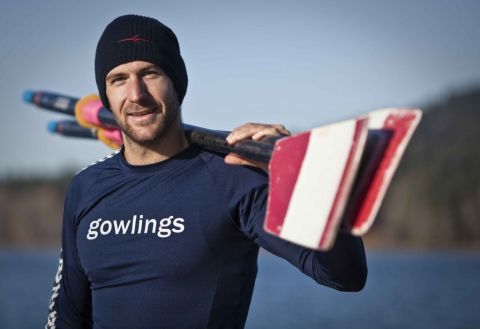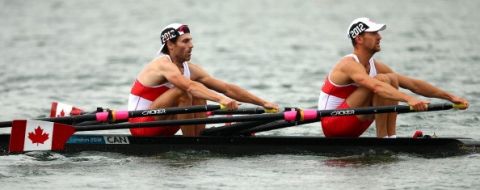

Have you ever wondered if it’s possible to pursue your sports, music or other passions while in law school? Queen’s alumnus Morgan Jarvis (Law’10, MSc’08, Artsci’05) did just that, training during his legal studies and going on to compete in the 2012 Olympic Games in London. After a couple of years as an Associate at Gowlings, and then in-house at a research hospital, he is a technology commercialization and IP specialist and the director of the Queen’s Business Law Clinic.
Image: Morgan Jarvis was sponsored by his articling employer, Gowlings (now Gowlings WLG), as he competed in the 2012 Olympic Games. (Photo: Kevin Light)
1. When did you first begin rowing? What is your favourite thing about the sport?
I discovered rowing purely by chance when I was 12. At my school, everyone had to pick a sport. Since I was one of the bigger kids, I was recruited for rowing. I enjoyed training, I liked the cross training, and I liked that I was continuing to improve my physical capacity, continually getting faster.
When I came to Queen’s I discovered my favourite part of the sport, the teamwork. I loved that a team is so much stronger than the individuals, with every member giving their best for each other. With rowing, we had crew boats with 8 like-minded guys, playing hard but also working hard together. It was a satisfying collegial environment. I liked how the more work you put in, the faster you get; there is a direct relationship between investment and benefit.
2. Was pursuing the Olympics always a goal of yours?
No, I just really enjoyed the sport and challenge so I kept getting better at it. It later became clear that the Olympics was a possibility so I went for it. If you think you have the potential to do something, you should go for it and live up to your potential. While training, I was on and off the national team and the school team for many years. In law school, I realized my potential when I became aware that I was faster than the guys currently in the boat for the Olympics.
3. Have you always wanted to practise law? What made you apply to law school?
I originally went to university thinking that I wanted to be a doctor and so I started off in life sciences. However, the life sci program was extremely competitive (and not in a positive way). I was looking for a more balanced school life as I wanted to keep rowing. When I decided I didn’t want to go to med school, I began a Masters in Pathology and Molecular Medicine. During my Masters I discovered that I didn’t really like lab work and I didn’t want to pursue a PhD, so I began thinking about intellectual property law because of my science background. Then one day, a guest speaker, the UN envoy for aids in Africa, came to Queen’s. Ironically, a lot of what he was saying had the opposite of his intended effect. His talk was very anti pharmaceutical companies, and I disagreed with it. I believe that there needs to be a balance between the need for access to inexpensive medicine and ensuring that companies can benefit from their work in research and development, and I found that the talk was one sided. I preferred to work for the pharmaceutical side and became more interested in the importance of intellectual property. This experience inspired me to apply to law school. Queen’s is great for its student services office, so I popped in to talk to Jane Emrich about possibilities in IP at Queen’s Law. I couldn't believe that the Director of Student Affairs would be willing to take a drop in and chat, providing the answers I needed for a third degree at Queen’s.
4. How did you make your decision to continue training while in the JD Program?
By chance. I didn’t train during my first year of law school or during my Masters. Later, a friend of mine wanted a partner to train with when I was in my second year of law school so I got back into it and we ended up beating most of the guys on the national team. I hopped in the single the next year and beat the guys who were the double lined up for 2012. That’s when I committed to going to the national training center in Victoria to train full time and go for the Olympic team.
5. How did you balance academic studies with rowing?
I didn’t row in my first year of law school and took it up again in second year. It’s a difficult balance but sometimes being physically active makes you more productive. I could usually handle one hour or two a day before it would have a negative effect on my work. I had to take the time out of somewhere, so I made the sacrifice from my social life and didn’t watch much TV or go out very often.
6. Why did you choose Queen’s?
I chose Queen’s largely because of the ease of access to reach people and information. At Queen’s, Jane directed me to a prof writing on IP issues so was able to get in as a research assistant in first year. At other schools I lined up tours where I specifically asked to speak with people working in IP, and when I got there all the professors were unavailable to talk. Professors were accessible at Queen’s. Also when I first chose Queen’s way back in first year of undergrad, I traveled to talk to the rowing coaches at universities across the country. Queen’s had a volunteer coach who started the rowing program while balancing his own family and career. This gave him a good idea of the right balance required to perform well academically while also being great athletes. Other university coaches were paid to coach, and for their team’s performance, and didn’t seem to care about academics. Queen’s is great at encouraging excellence as a student-athlete and not just as an athlete.
7. How did you manage articling with training for the Olympics?
While I was summering with Gowlings (now Gowlings WLG) in Ottawa, I was aware that I could make the Olympic team. I didn’t want to give up the great job in IP law I had been working hard to get, so I asked if they wouldn’t mind delaying my articling for a couple of years, so I could go for the 2012 games, and they agreed to that. They even sponsored me!
8. How has being an athlete while studying law at Queen’s helped you in your career?
Training boosts productivity and improves time management. Good student athletes have learned early on how to get the most out of their time. Other people might enjoy other activities like music to re-energize- it’s important to keep that balance. Also, law firms, in addition to grades, look for something that makes an applicant stand out, so standing out through some other unique experience will make your application more well-rounded and give you something to talk about at the receptions.
9. What advice would you give to students considering pursuing a sport or other passion while in law school?
It’s important to keep a balance. You need good time management and need to make sure to plan your time. Set aside time and energy for the things that are important for you to be at your best. It’s easy to succumb to outside pressure about where you need to be but make sure you stay in control of your time so you do the things that you know will make you be your best.
– Sarah McCarthy